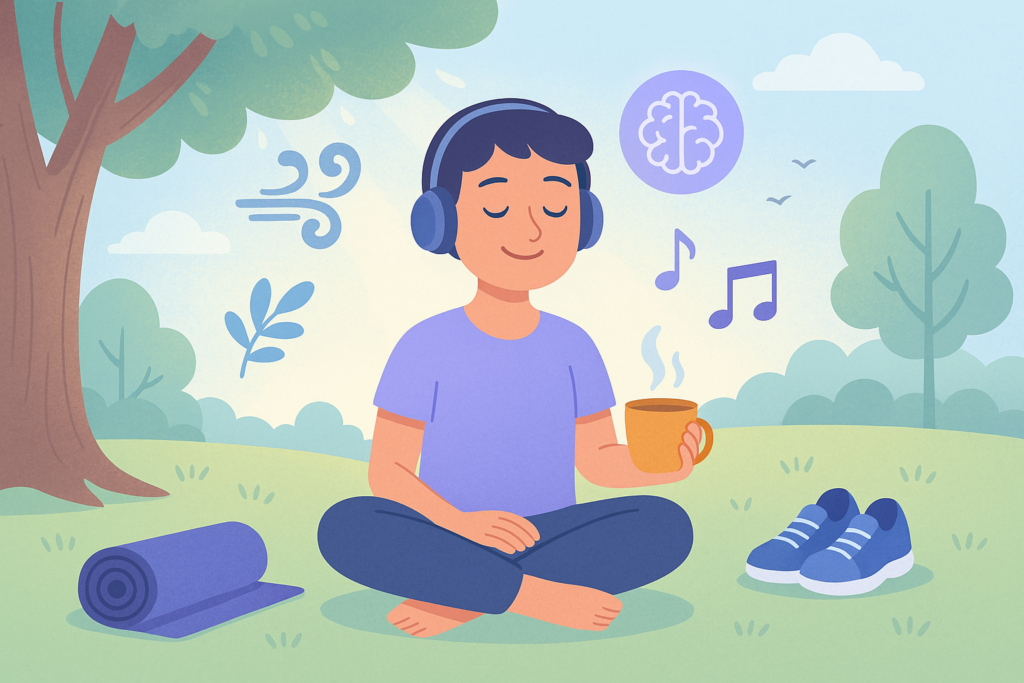Ever felt a nagging feeling in your stomach or a racing heart? You might think it’s just stress. But, many people ignore these signs, thinking they’re normal. Yet, these symptoms could mean something more serious is happening inside you.
In this article, we’ll look at the signs of anxiety you might see. We’ll also talk about why it’s important to notice these signs early. This can help keep you healthy and happy.
Understanding Anxiety and Its Common Indicators
Anxiety disorders are different from everyday stress. They involve persistent fear or worry that can be overwhelming. This can affect daily life. Knowing the difference helps in spotting anxiety early and managing mental health better.
The Nature of Anxiety Disorders
Anxiety disorders are varied but share common challenges. People might feel constant fear that seems too much for the situation. Conditions like Generalized Anxiety Disorder and Panic Disorder show the range of symptoms.
Understanding anxiety disorders helps people know when their feelings are more than just stress. It’s about recognizing when it’s time to seek help.
Recognizing Everyday Stress vs. Anxiety
Everyday stress is a normal reaction to life’s challenges. It’s usually manageable and comes from things like work or relationships. On the other hand, anxiety is more intense and lasts longer.
Knowing the difference is key for those dealing with anxiety. It can disrupt routines and make life less enjoyable. Being aware helps in taking steps to address these feelings.
Physical Symptoms You Might Experience
Anxiety can show up in many ways, making you feel worried. These signs are your body’s way of saying it’s stressed. Knowing what to look for can help you get the support you need.
Increased Heart Rate and Palpitations
One common sign of anxiety is a fast heartbeat. You might feel your heart beating too quickly, which can be scary. If this happens a lot, it could mean you have an anxiety disorder.
Shortness of Breath
Feeling like you can’t catch your breath is another symptom. It can happen when you’re stressed or even when you’re calm. Learning to handle this can help you feel better and find ways to relax.
Muscle Tension
Feeling tight muscles is a common anxiety symptom. It can make you uncomfortable and even cause pain. Recognizing these signs can help you find the right help. For more on anxiety symptoms, see this resource.

| Symptom | Description |
|---|---|
| Increased Heart Rate | A rapid heartbeat, often felt during stressful situations. |
| Shortness of Breath | A feeling of not getting enough air, may occur at rest or during exertion. |
| Muscle Tension | Persistent tightness in muscles that can lead to discomfort and pain. |
Emotional Symptoms You Shouldn’t Dismiss
Emotional symptoms of anxiety greatly affect your daily life. Ignoring these signs can harm your mental health. Knowing these signs helps you see when anxiety is affecting your feelings.
Persistent Worry and Fear
Persistent worry can become a constant part of your day. It feels like a deep fear that’s always there. This fear makes it hard to focus or enjoy time with others.
You might feel very anxious over small things. It’s key to notice these feelings and find ways to deal with them.
Irritability and Mood Swings
Irritability often comes with anxiety. You might get upset over small things or feel more sensitive. Mood swings can make it tough to get along with family and friends.
Seeing these mood swings as signs of anxiety can help you find better ways to handle your feelings.
Feeling Overwhelmed
Feeling overwhelmed can mean your emotions are struggling. Daily tasks can seem too much, making you feel helpless. It’s important to recognize these feelings to improve your emotional strength.

Cognitive Symptoms That Can Impact Your Life
It’s key to know how anxiety affects your mind. These symptoms can mess up your daily life. It’s vital to spot and tackle them quickly.
Difficulty Concentrating
Anxiety can make it hard to focus. It might turn simple tasks into big challenges. This can lead to feeling stuck and less productive.
Racing Thoughts
Racing thoughts are a sign of anxiety. Your mind might feel like it’s racing, making it hard to relax. This can be very draining.
Memory Issues
Anxiety can also mess with your memory. You might forget important things or struggle with organization. This can make it tough to keep up with work or home tasks.

Behavioral Changes Linked to Anxiety
Anxiety can change how we act in daily life. These changes often come from feeling uneasy in certain situations. They affect our habits and well-being. Spotting these changes is key to grasping how anxiety impacts our lives.
Avoidance of Certain Situations
A big change linked to anxiety is avoiding certain situations. You might avoid social events, places, or activities that make you anxious. This avoidance can trap you in a cycle of missed experiences and chances.
Changes in Sleep Patterns
Anxiety can also mess with our sleep. You might have trouble sleeping or sleep too much to avoid anxious thoughts. These sleep changes can lower your energy, focus, and health. It’s important to tackle these sleep issues quickly.
Social Withdrawal
As anxiety grows, some people pull back from social interactions. This is a way to avoid situations that make them anxious. But, it can lead to feeling lonely and isolated. It’s important to see how anxiety affects our social lives and seek support.

| Behavioral Change | Description | Impact on Daily Life |
|---|---|---|
| Avoidance Behavior | Steering clear of anxiety-triggering situations. | Limits experiences and opportunities; perpetuates anxiety. |
| Changes in Sleep Patterns | Increased insomnia or excessive sleeping. | Affects energy levels and cognitive function. |
| Social Withdrawal | Avoiding social interactions to escape anxiety. | Leads to feelings of loneliness and further anxiety. |
How Anxiety Symptoms Can Vary by Individual
Anxiety shows up in different ways for everyone. It’s influenced by things like personality and background. Knowing these differences helps tailor support and improve self-care.
The Role of Personality and Background
Your personality greatly affects how you feel anxious. Some traits, like being very sensitive or needing everything to be perfect, can make anxiety worse. Life experiences and culture also play a big part in how anxiety looks for each person. People from different backgrounds face unique challenges that affect their mood.
Age Differences in Symptoms
Anxiety symptoms change as people get older. Young people, like teens, often deal with school stress and social issues. Older adults might worry more about health or retirement. It’s important to understand these age-related differences to help them better.
| Age Group | Common Symptoms | Typical Triggers |
|---|---|---|
| Teens | Social withdrawal, irritability, racing thoughts | Academic stress, peer pressure |
| Young Adults | Panic attacks, excessive worry, difficulty concentrating | Career choices, relationship pressures |
| Older Adults | Sleep disturbances, muscle tension, fear of loss | Health issues, lifestyle changes |
Recognizing Early Warning Signs
It’s key to know the early signs of anxiety to keep your mind healthy. Being aware of your thoughts and feelings helps you catch changes early. This way, you can handle your anxiety before it gets worse.
The Importance of Self-Awareness
Knowing yourself is vital in spotting anxiety signs. When you understand your emotions better, you can tell when something’s not right. This knowledge lets you act fast, stopping anxiety before it starts.
Journaling as a Tool for Tracking Symptoms
Journaling is a great way to understand and manage anxiety. Writing down your thoughts helps you see what triggers your anxiety. It’s not just a diary; it’s a tool for learning about your feelings.
Keeping a journal regularly helps you find better ways to cope. It gives you more control over your anxiety. For anyone dealing with anxiety, journaling is a powerful tool.
When to Seek Professional Help
Knowing when to get help for anxiety is key for your health. Anxiety can show up in many ways, and some signs might be more serious than you think. If anxiety stops you from doing things you love or feels too much, it’s time to talk to a doctor. Checking how bad your symptoms are helps you understand what you’re dealing with. This can lead to treatments that really work for you.
Evaluating the Severity of Your Symptoms
Start by thinking about how anxiety impacts your life. Ask yourself:
- Does your anxiety stop you from doing things you enjoy?
- Do you have repeated panic attacks without a clear reason?
- Is the anxiety making you feel really tired or hopeless all the time?
If these questions worry you, it’s a good idea to look into getting professional help for anxiety. The sooner you tackle these issues, the better you’ll feel.
Understanding Treatment Options and Resources
There are many ways to treat anxiety, and what works best for you will depend on your situation. Cognitive Behavioral Therapy (CBT) is a great choice, helping you change negative thoughts. Medications like antidepressants or anxiolytics can also help, mainly for severe cases. Talking to your doctor can help figure out the best treatment for you.
Support groups and educational materials can also help you manage your mental health. Understanding your symptoms and the resources available is the first step to a healthier life.
Common Misconceptions About Anxiety Symptoms
Understanding anxiety is more than just knowing its signs. Many myths about anxiety confuse people and make it hard to get help. It’s important to clear up these misconceptions to help others.
Debunking Myths Surrounding Anxiety
Some think anxiety shows weakness. This stops people from talking about their feelings or getting help. Another myth is that you can control anxiety by yourself. This makes things worse and isolates those who need support.
It’s key to know that anxiety can hit anyone, no matter how strong they are.
How Societal Stigmas Affect Recognition
The fear of talking about anxiety is big. This silence keeps myths alive and makes things harder for those with anxiety. Mental health issues are often seen as shameful, which is why we need to change this view.
Seeing anxiety as a real health issue helps create a safe space for talking. This is how we can support each other better.
Strategies to Manage and Cope with Anxiety Symptoms
Managing anxiety symptoms can really improve your life. Practicing mindfulness and using coping strategies can help a lot. Breathing exercises, for example, can calm you down and help you deal with anxiety.
Adding mindfulness to your daily life helps you understand your feelings better. It also helps you know what triggers your anxiety.
Making lifestyle changes can also help. Regular exercise, a healthy diet, and enough sleep are key. Taking care of your body helps your mind too. These changes can prevent anxiety from getting worse.
Building a support network is also important. Having friends, family, and professionals who get it can be a big help. They offer emotional support and help you feel better.
Talking to others can give you new ideas and remind you that you’re not alone. Using these strategies together can help you manage your anxiety better. It lets you take charge of your mental health.



